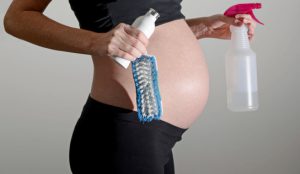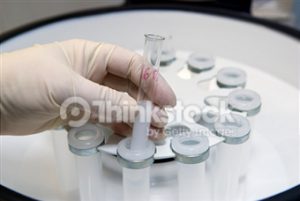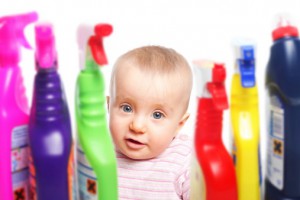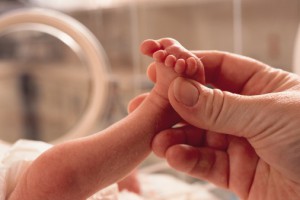Many expecting moms develop a nesting instinct; and uncontrollable urge to clean their home in preparation of their new baby’s arrival. Flushing Hospital wants moms to know that while tackling most chores is totally safe, there are some tasks that may pose a risk to your health and the health of your baby.
• Moving heavy furniture when you’re pregnant can be dangerous. Hormonal changes during pregnancy can make your connective tissue and ligaments looser, which increases the risk of muscle strains and injury. In addition, your center of gravity can shift as your pregnancy progresses which can throw off your balance. These changes make lifting more challenging, further raising your chance of injury. Your best bet is to let someone else do the moving.
• Changing your cat’s litter box can lead to a condition known as toxoplasmosis, a parasitic infection that can be transmitted through infected cat poop. If you’ve never had toxoplasmosis before, you could possibly become infected while pregnant and pass the illness on to your baby. Toxoplasmosis can cause flu-like symptoms in adults, but in a baby during the early stages of pregnancy it can cause serious birth defects such as eye and brain damage.
• While there is still a debate about the effects paint can have on pregnant women and their babies, it’s generally considered a good idea to limit your exposure to paint and paint fumes while pregnant. Most paint contains solvents that can cause health problems when inhaled too much. Having a room in your home painted is probably not a high risk for you or your baby, but if painting needs to be done, have someone else do it and make sure there is good ventilation to avoid inhaling paint fumes.
• It’s not ideal to use ant and roach spray during pregnancy. The low exposure of occasional use is unlikely to pose a risk, but some studies have indicated there may be a link between exposure to these products and child development problems. While these studies are inconclusive, it’s probably best to play it safe and minimize use. Instead of using sprays, it is recommended to use baits or other products that are not likely to be inhaled.
With all other cleaning products, it is best to practice safe use. Wear gloves and other protective clothing to protect your skin from exposure and use a mask to prevent inhaling unnecessary chemicals. Attempt to open windows or use a fan to ventilate the area you are cleaning and always read manufacturer’s labels before using a cleaning product. If you are unsure about a household cleaning product, speak with your doctor first before using.
Flushing Hospital’s Women’s Health Center has an expert team of doctors and nurses to guide you through every step of your pregnancy. For more information, or to schedule an appointment, please call 718-670-8992.
All content of this newsletter is intended for general information purposes only and is not intended or implied to be a substitute for professional medical advice, diagnosis or treatment. Please consult a medical professional before adopting any of the suggestions on this page. You must never disregard professional medical advice or delay seeking medical treatment based upon any content of this newsletter. PROMPTLY CONSULT YOUR PHYSICIAN OR CALL 911 IF YOU BELIEVE YOU HAVE A MEDICAL EMERGENCY.




 This week, March 20-26 is Poison Prevention Week. Did you know that every year more than 2 million poison-related injuries and deaths are reported in the United States and more than 90 percent of these cases occur in the home?
This week, March 20-26 is Poison Prevention Week. Did you know that every year more than 2 million poison-related injuries and deaths are reported in the United States and more than 90 percent of these cases occur in the home? Learning that your baby will be arriving early can be overwhelming. You may grow anxious as you wonder; what happens next? Having a premature baby does have its challenges; however you can better prepare yourself for what to expect through education.
Learning that your baby will be arriving early can be overwhelming. You may grow anxious as you wonder; what happens next? Having a premature baby does have its challenges; however you can better prepare yourself for what to expect through education.